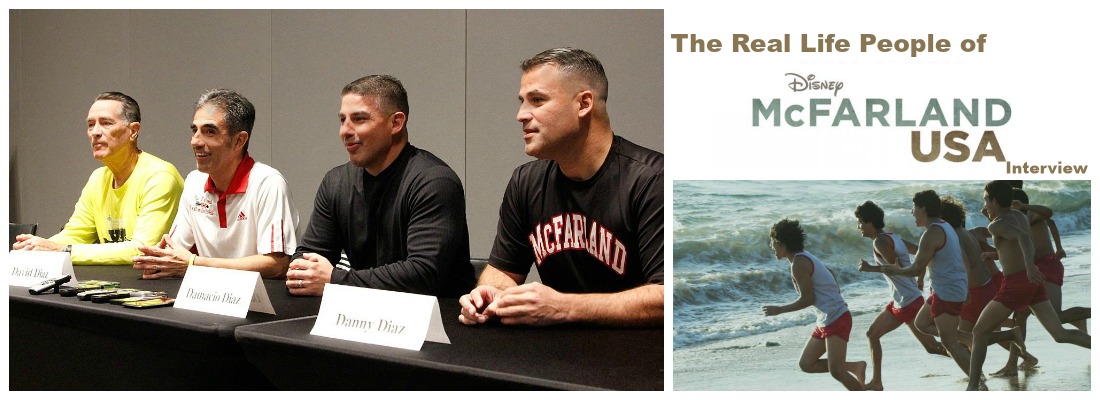
It’s not often that when there’s a movie based on a true story that bloggers get to meet the people behind the real story. The only other opportunity I had to do something like this was for Million Dollar Arm, and at that time I realized that I really love these interviews. The people portrayed are typically relaxed and usually full of great back stories. Meeting the real life runners and coach that the story of McFARLAND, USA is based on was a true joy. Their excitement was clear as I saw the smiles on the faces of Coach Jim White, and former Cougar running brothers, David Diaz, Damacio Diaz and Danny Diaz.
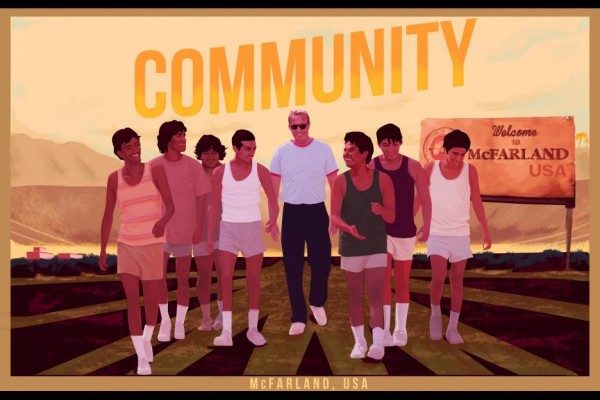
In the making for 15 years, Jim White wanted to share the true story of the 1987 novice runners from McFarland, an economically challenged town in California’s farm-rich Central Valley, as they give their all to build a cross-country team under his direction. Played by Kevin Costner, Jim White’s story at McFarland begins when he is a newcomer to their predominantly Latino high school. When Coach White realizes the boys’ exceptional running ability, he sets out to start a running team and quickly the story of the power of family relationships, their unwavering commitment to one another and their incredible work ethic is shared. As Kevin Costner shared, “When you make someone feel like they belong they start to feel like giants.” And this story shares this message in such a heartwarming way.
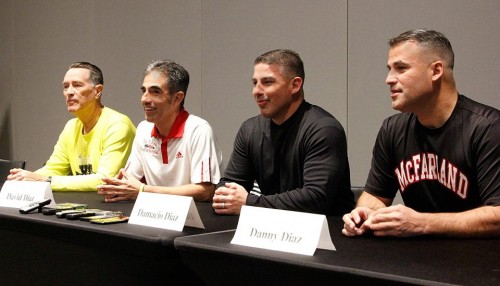
Photo Credit: mamalatinatips.com
The Real Life People of McFarland USA
Sitting down with the Diaz brothers and Coach White was refreshing. Knowing that the film was pretty real to life with a few exceptions, ones that the brothers were happy to point out. But one thing that stayed true to life was the culture of the people of McFarland.
One of the bloggers shared that her dad and grandfather were both pickers in Texas, and then asked, do you feel like the movie does a good job of describing that culture?
Damcio: Yeah, we’re very, very proud of the way the movie portrayed us and our family. We were raised in the field. That was our life. We started picking and hoeing and raking and doing everything you could possibly think of when we were about seven or eight years old. So for us, it was a way of life. Even some of us, after graduating college, like Danny, the day after he graduated from the university with the diploma, he was in the fields working, because that was, in our family, what was expected until he got hired and got his job. So, for us it was normal.
In the movie, Señora Diaz was a tough mama, so for the Diaz brothers, is your mom really that way, because actress Diana Maria Riva is a scene stealer? Did she give your mom and her strictness justice?
David: Not at all. (Laughing) Much worse. (Laughing)
Coach White: Let me answer that, ’cause when Mrs. Diaz saw this film the first time, she came out and she said I love the film, but they didn’t make me strict enough.
David: Yeah, so just to let you know; I think Hollywood did a, a very good job of depicting and not making it look too guilty as regarding CPS (Child Protective Services). (Laughing) So, just to let y’all know, we’re proud of what Hollywood did and what (Director) Niki(Caro), and the producer and everyone did, but, we lived in a very, very strict environment and still do to this day.
With this story, how has your hometown of McFarland changed over the years?
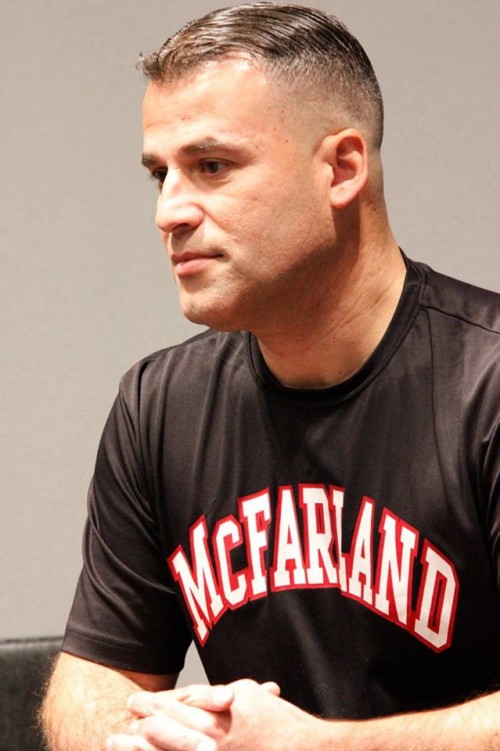
Photo Credit: mamalatinatips.com
Danny: I can answer that. Growing up in McFarland, we didn’t have much. There’s nothing to do in McFarland. Um, (Laughing) when we were growing up, maybe seven, eight, nine, ten thousand people was the population. It’s grown a little bit in the last two, three years but not much has changed. It’s a poor community. When you’re driving on 99, the freeway, and you blink and you’ll miss it. And there’s not much to do there. We don’t have the big malls. We don’t have actually any malls. (Laughing) And we don’t have the big grocery stores. And so, it’s just a fun place to be. But if it weren’t for sports, our kids would be lost, because it’s either, you know, education and sports or the streets. And those are the two extremes and those are the two options that are there for our community. Right now our community is excited obviously with the movie and rightfully so. All the notoriety that they’re getting and what this man over here, Mr. White, our coach, has brought to not just our program but to our community. Uh we all feel grateful and the whole community’s just embracing it.
Coach White: Let me add a little bit to that. His viewpoint of not changing too much from that aspect, well I see a definite change. We have changed our city logo. We are no longer the heartbeat of Agriculture. Now we are a runner running through the field, a silhouette of a runner. And underneath it says, Tradition, Unity, and Excellence. So, that’s a big change.
Tell us about those almond stacks made into hills that they showed in the movie that was used to train, what was that like?
Damacio: Oh — they’re a lot worse.
Are you kidding me?
Damcio: Oh, no.
David: Uh, that — it doesn’t do it justice.
Danny: Yeah, if you drive 600 miles out east from McFarland, Mr. White here would take us to the hills. And, wow, those hills are not rolling hills. Those suckers are steep.
David: So, it helps you running wise and, you know, mentally as well, because you have to endure that, that steepness, if you will.
Can you share a little bit about what your first reaction when you heard that not only was your story going to be a movie but specifically this movie and knowing what these true life, inspirational movies become?
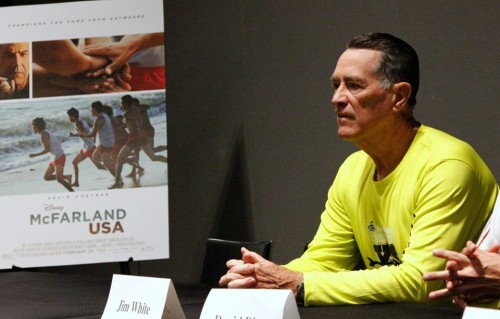
Photo Credit: mamalatinatips.com
Coach White: Well, from my, my aspect, I guess, it was in various stages, because this was about a 15-year process for us, my wife and I. We signed with this one company. Two years later, we signed with another one, it took a long process. When actually Disney got to read it we were thrilled very much so that they had it, because then we knew that it shouldn’t have any sex and cussing and cigarettes and this type of thing, you know. We were very happy that that was going to take place. But in reality, too, the script that was written, we prayed that it would never happen. And it didn’t, because they threw it out. And then Disney re-signed us and got a better script writer. And that’s the one we have now.
David: So, just to go back and let you know how my mother was depicted in previous scripts (Laughing) was, was probably a more accurate version. But this is gonna be a family movie, so it, it is okay.
Did you have any input on the making the movie?
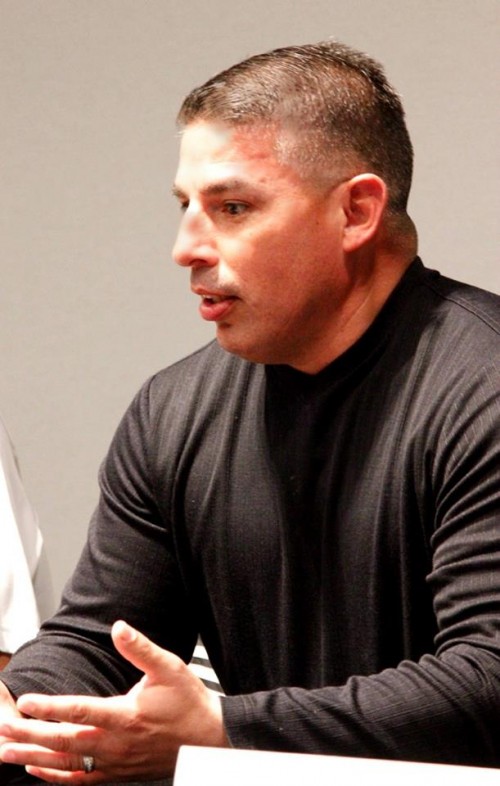
Photo Credit: mamalatinatips.com
Damacio: Mr. White might have had more than, than us. We, we basically told our story, got interviewed for hours and hour and hours, and that was pretty much it. Mr. White had a lot more influence in how this script was written.
Danny: Once you give them your story, obviously you sign with them. Then they can do whatever they want. So, with myself, they, they made me chubby in the movie. They Made me…
Damacio: Go ahead and call it. It was fat.
Danny: Huh?
Damacio: They said you’re fat. (Laughing)
Danny: I’m trying to be nice here, (Chuckling) and hecka hella slow, (Laughing) when you watch the movie, you know. So that’s okay. That’s what they wanted to do, and I’m just excited to be included in the movie. They could’ve chosen any other team, because we have nine state titles. And so, you know, the fact that they went back to the original first year that we won state, some of these teams that came after us were way better than us, way better than me as far as the running. And so, we were just happy that Disney stuck with that first year and we’re lucky to be in the movie.
So, Danny since you’re talking about how they made you a little different. Is that how the last race happened?
David: Oh, yeah.
Danny: That is true. That is definitely true. That was my experience for the first time at a grand stage, (Laughing). These guys had all the pressure. I was just running to displace other runners and add them more points. If I could beat their third, fourth, fifth man, sixth man whatever, I would add more points to them, so that’s why we had the sixth and seventh runner on a team. And, and that day I was the fifth runner and I felt so much pressure, but you know, luckily we were able to pull it off.
Did that change how you ran in future races?
Danny: Well that was the last race for that year. Then the following season, we were ranked number one for the entire season. It was 1988 and I was a senior at that time and my brother, Damacio, was a junior. And we were running number one all year long. And low and behold, Mr. White, during Thanksgiving break, when we have no school, he had an emergency. He had to take off to Stockton to be with his family with a family situation and he left us there to train on our own. We didn’t train. We (Laughing with his brothers), we played…
David: We played basketball.
Danny: We love basketball. (Laughing) All of us are basketball players.
David: We wish were, yeah.
Danny: And we played basketball the entire week. (Chuckling) And, and we didn’t train and we got fifth that year. We should’ve had first. So Mr. White never went back to Stockton never again. (Laughing)
Since some of you chose to take the route of being educators yourselves, how much of an influence was Coach White in taking that path in life?
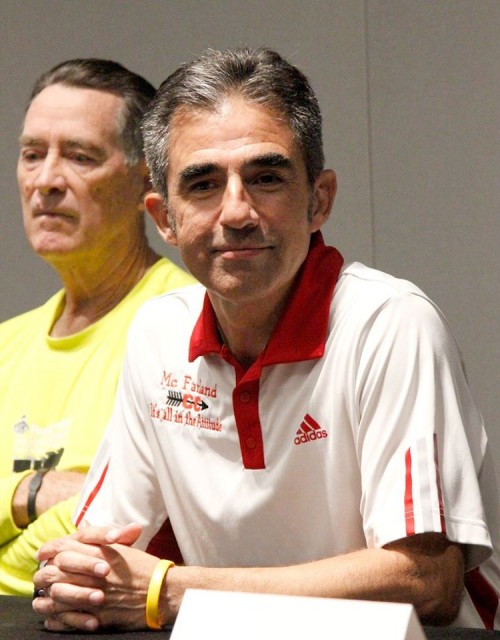
Photo Credit: mamalatinatips.com
David: He was a very inspirational part. You know, we are a God-fearing folk, so we were teaching in Sunday school and we were part of the Royal Rangers and so we did that on Tuesday nights at our local church, but, yeah, you know, Mr. White was there as a person that we can rely on. And believe it or not, before he was a coach, he was a scientist. He was a fifth grade teacher and before he was a P.E. teacher. And so he’s a very knowledgeable guy when it comes — you pick up any type of bug or any type of leaf, he knows what it is. And we try to trip him up on that, and he’s very smart in that regard. Um, he’s a pretty good coach, too. (Laughing) But, as far as wanting to be a teacher, you know, he wasn’t the only reason why we got into the education, but he was one of the two or three maybe. Yeah, my parents definitely pushed us to go the education route and not the route that, you know — the wide road most people go to is other than college. Now college is very, very encouraged, but back in the day I wouldn’t say that a fifth of the folks in high school ended up, especially folks of our color and our culture, maybe they started school, but, but hardly any of us finished. So, it was a big, big deal for us.
Coach White: Let, let me add one thing to that. Uh, Mr. Diaz, their dad, Paul, he pushed education real hard, too. And so he felt like, and this is what he told me, he says, I want them to get their education, so I will go back and get my education, and he did. He went back and got it.
Damacio: He got a GED in 1990.
Wow that is incredible! In the movie, Coach White, you spent a day picking in the fields with the boys. Did you ever do that again?
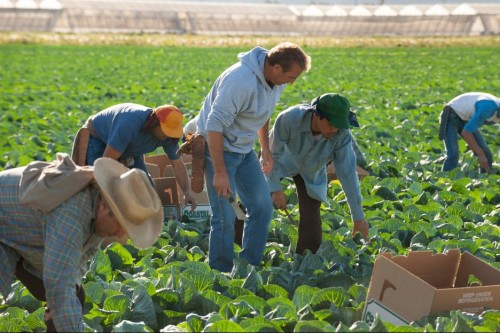
Coach White: I’ve done it quite often. I didn’t enjoy it very much. (Laughing) And in the movie it was cabbage, we didn’t do cabbage. We didn’t have that close to us. That was the only thing really that they had available to show that type of work. It’s grapes and it’s oranges and it’s almonds and it’s cotton and stuff in our area, but those weren’t available. So, that was a real good, part of the movie though. But, yes, I did that. I used to take Damacio and some of his peers. And I took them to the fields because I was looking for workers and to try to get us some income so we can go to Oregon and we can go to San Jose and we can put shoes on their feet. So the only way I could get some of them into some of the fields that I had to do the work with ‘em. So, that was good.
David: And just to let you know, God’s good and we own almonds now. (Chuckling) And about two years ago, Mr. White helped me pull. He was out in my field still in the evening helping me do my work.
That is awesome.
David: And he’s retired! (Laughing)
In the movie it shows how your culture is all about community and it takes a village to raise a child. Is that still happening in McFarland?
Danny: Oh, absolutely. It does take a village (Chuckling) to raise a child. In our case there’s seven and my dad worked a lot of hours. So, my dad worked ten, twelve, thirteen, fourteen hours a day sometimes. Both of my parents come from large families. My dad has 13 brothers and sisters. My mom has 12. So we have a lot of uncles and everybody has a lot of kids. Uh, I have seven kids myself. (Laughing) All of us have a lot of kids. So if not for the help of our cousins and our uncles and our friends and our, our church, it’s really difficult during these times to raise a child. And then to keep him on the narrow road or that straight road is tough. So I’m always looking out for their kids. They’re looking out for my kids and we’re trying to police each other, because it’s very easy to get distracted and go way off course.
Damacio: And if I can add to that. (Chuckling) Same thing happened back in the day when we were kids. Our father never could ever go watch us race. We were racing big races and trying to accomplish big things, so we looked at Mr. White as our dad. He literally would buy us shoes, feed us, counsel us, console us when we lost, that kinda stuff. And so, we have a great dad. We love our dad. He is amazing. But Mr. White was our second father. He did a lot of things for us that our dad couldn’t, because it financially just wasn’t available.
Follow McFARLAND, USA on Facebook
Follow Disney Pictures on Twitter
McFARLAND, USA is rated PG and opens in theaters everywhere on February 20th!
*I was invited by Disney to attend the press junket for McFarland, USA. All opinions are my own.
- You Have to Remember – 9/11, 20 Years Later - September 11, 2021
- Creating the Perfect Look with a Maxi Dress - October 20, 2020
- Brand Better Giveaway - October 6, 2020


This is really neat!
I can’t wait to see this movie. We need more feel good films!
I would like to know more about Coach Whites wife and daughters. Did his daughters stay in McFarland? I watched the move for the first time tonight and I thought it was wonderful. I hope more people watch this movie. My husband watches it at least 5 days out of the week. I hope I can find the DVD for him.
Thank you,
Carol Ann Brown